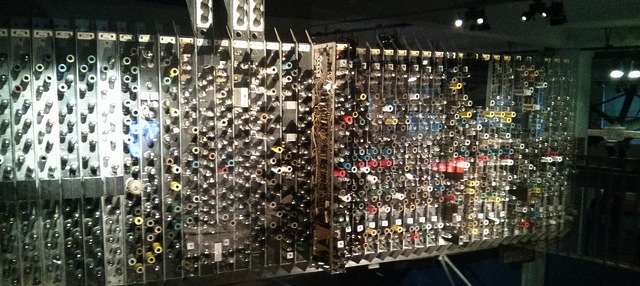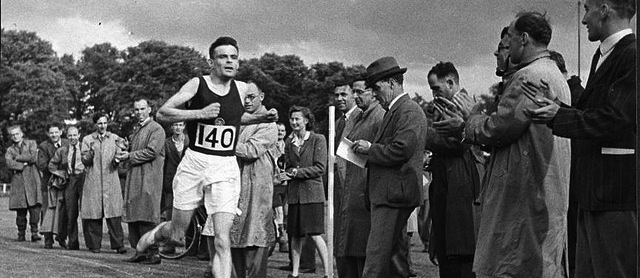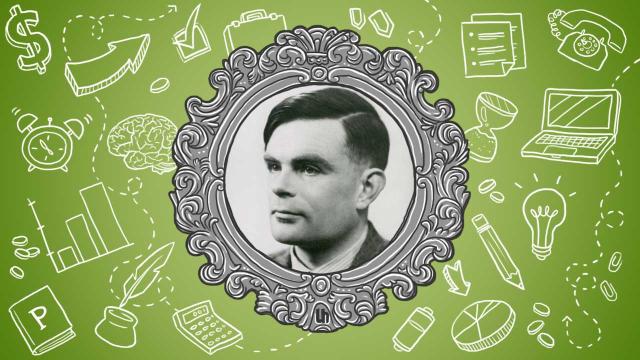Alan Turing is one of history’s first computer scientists. Not only was he a mathematician, logician, and cryptanalyst, he was also one of the most influential figures in the modelling of the first computer. You don’t accomplish all that without some clever productivity tricks.
Turing has popped back into the public spotlight recently through the award-winning movie The Imitation Game, a biopic about his life, with Benedict Cumberbatch playing the lead role. In 2013, he was pardoned for the “gross indecency” charges related to homosexual acts in the United Kingdom that led to him being treated with hormones and his eventual suicide in 1954. Turing’s achievements included a key role in helping crack the Enigma coding machines used by Nazi Germany and developing the now-famous Turing test — a key moment in the developme t of artificial intelligence. Let’s take a look at some of the tricks he used to accomplish those feats.
Break Down Larger Tasks Into Small Ones
One of Alan Turing’s most obvious skills was his ability to break large problems into smaller ones so he could solve them one step at a time. It’s an incredibly difficult skill to master, but one that proved useful for Turing throughout his life. The big picture was certainly on his mind, but he was capable of breaking that into surmountable slices.
As Ars Technica points out, this is evidenced in how Turing and his team approached cracking the Enigma Machine, a ciphering system used by Nazi Germany in World War II to send encrypted messages:
First, Turing and company noted that Enigma machines could not encrypt any letter as that letter itself–this eliminated thousands of possible combinations. Then his team seized on patterns revealed when sloppy German operators neglected to change their settings. The British navy captured Enigma gear–codebooks, instruction books, and even Enigma rotors on occasion. These came in handy for the challenging work ahead…
Here was the “computable numbers” concept set to work. One step at a time; one breakthrough after another. The first Bletchley Bombe weighed a ton and implemented all these code-cracking procedures by replicating the activities of around 30 Enigma gadgets working at the same time.
We’ve talked before about breaking problems down systematically so they’re solvable, and Turing knew the importance of this better than most. Turing broke down the problem of the machine by carefully looking at each part of it, organising what was happening, and then solving each small problem individually. It’s something we can all learn from.
A Messy Desk Can Breed Creativity

We’ve already debunked the idea that messy desks hinder productivity, and Turing (among many others) were of the mind that a cluttered desk was a boon for creativity. In fact, as MIT suggests, it’s simply how many brilliant people have worked over time:
Messiness is often associated with artistic, creative and scientific or mathematical genius, spontaneity, but also with carelessness, eccentricity, madness and unreliability. Neatness is associated with preparedness, confidence, attention to self-presentation, efficiency, and stability, but also with hierarchy, rigidity and mundanity …
Famous examples of each personality type abound. In the messy camp, Albert Einstein, Francis Bacon, Alexander Fleming, and Alan Turing were all notoriously messy geniuses whose unkempt appearances matched their chaotic laboratories and studios. Meanwhile, David Beckham, the English footballer, and Martha Stewart, both notorious neat freaks, could stand for the personification of Confidence and Pristine Order respectively.
Over time, we’ve seen varying studies that have argued for and against the idea of whether a clean desk or a messy desk is more efficient. Chances are it’s a personal trait: if you’re a person who thinks best with a messy desk, don’t worry about it, as it’s probably not affecting your productivity as much as those who prefer neatness would have you believe.
Exercise To Clear Your Mind

Despite the ‘unfit’ stereotype often associated with geek minds like Turing, he was an avid runner and enjoyed exercise. Indeed, Turing came in fifth during a marathon used to qualify for the 1949 Olympics. Running was a key part of his routine, and it helped him clear his mind:
I asked [Turing] one day why he punished himself so much in training. He told me, ” I have such a stressful job that the only way I can get it out of my mind is by running hard.”
Turing certainly isn’t the first person to use exercise to do this, and definitely not the only one, but he stands as a good reminder that exercise is a great way to help you think straight.
It’s unfortunate — screw that, it’s tragic — that the fierce homophobia evident in post-war Britain meant Turing’s full achievements weren’t recognised until years after his death. But there’s plenty you can learn from him now.

Comments
2 responses to “Productivity Tricks From Famed Computer Scientist And Mathematician Alan Turing”
1949 Olympics? That doesn’t sound right.
Typo copied and pasted from the linked article. Probably meant to be 1948 Olympics, based on the context.
What happened? You guys couldn’t be bothered respecting Turing and his ideas by getting an actual photo of him to use with the article so you put Cumberbatch up there? Is there a rights/use issue with photos of Alan Turing? For a man who should be a geek hero and was treated heinously by his own nation, It would be good to do him more service than this, surely?